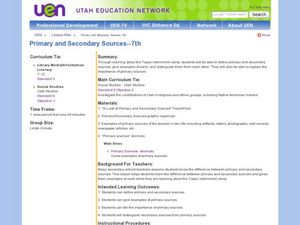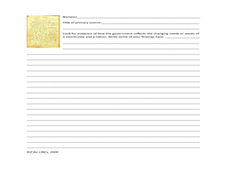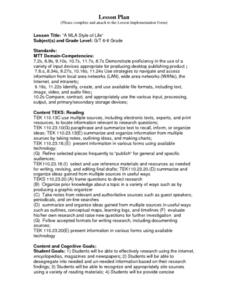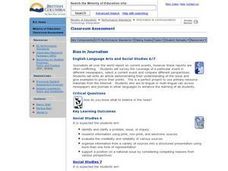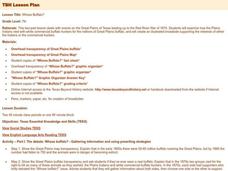Curated OER
Primary and Secondary Sources - 7th
A link to a beautiful Animoto presentation is included, giving examples of primary sources that a student might want to contact when doing research. Using the Topaz Internment Camp in Utah as a sample topic, middle schoolers view a slide...
Curated OER
Understanding and Using Primary and Secondary Sources in History
Explore primary and secondary sources in this historical analysis activity. Young researchers define the terms primary source and secondary source. They read a primary source document provided by the teacher and answer questions about...
Curated OER
Analyzing Primary Sources
Analyzing primary and secondary sources is a necessary skill for students to attain, and can be learned through interesting activities.
Curated OER
Primary vs. Secondary Sources Notes
What’s the difference between primary and secondary source materials? Here’s a handout, designed as a reference for learners, that does a good job of distinguishing between primary and secondary source materials and providing examples of...
College Board
Evaluating Sources: How Credible Are They?
How can learners evaluate research sources for authority, accuracy, and credibility? By completing readings, discussions, and graphic organizers, scholars learn how to properly evaluate sources to find credible information. Additionally,...
Canadian War Museum
Comparing Primary and Secondary Sources
This simple two-day lesson introduces learners to the differences between primary and secondary sources. The lesson includes group work that explores the similarities and differences, and the advantages and disadvantages of primary and...
Curated OER
The Crittenden Conway Duel
Young scholars explore primary and secondary sources. For this primary and secondary source lesson, students investigate a crime scene. Young scholars search for evidence around the classroom and evaluate their findings. Students write a...
Mr. Roughton
Cold Case Rome
Pupils are transformed into detectives in the case to solve the motive behind the assassination of Julius Caesar. This resource includes eight engaging "exhibits" of unique primary and secondary sources for students to analyze during...
Idaho State Department of Education
Lessons for Social Studies Educators
Point of view, purpose, and tone: three concepts readers of primary and secondary source materials must take into account when examining documents. Class members view a PowerPoint presentation and use the SOAPS strategy to identify an...
Curated OER
Towards Separation of Church and State in Gloucester
Explore New England government in the 1700's with your class. They will identify historical documents as primary or secondary sources, then read and discuss the significance of these documents as they relate to the "freedom of religion"...
Curated OER
Primary Sources and Protagonists: A Native American Literature Unit
Introduce your middle schoolers to the lives of past Native Americans. First, learners work together to put photographs in a sequence. Then, using their sequence, they create stories to share with the whole class. No matter how old your...
National Park Service
A Tale of Two Men
Theodore Roosevelt and the Marquis de Mores were both born in 1858, and both came to the Dakota territory in 1883, but they influenced the developing country of America in different ways. Elementary and middle schoolers apply written and...
iCivics
Drafting Board: Interest Groups
Does the influence of interest groups harm a political system? Your class members will analyze the role of interest groups in American politics, as well as consider the effect of perspective, bias, loyalty, and the First Amendment.
Curated OER
"A MLA Style of Life"
Students effectively research using the internet, encylopedias, magazines and newspapers. They desegregate into needed and un-needed information based on their research findings. Pupils recognize and appropriately site sources using a...
Albert Shanker Institute
Economic Causes of the March on Washington
Money can't buy happiness, but it can put food on the table and pay the bills. The first of a five-activity unit teaches pupils about the unemployment rate in 1963 and its relationship with the March on Washington. They learn how to...
Curated OER
A Journey Through Time!
Students use primary and secondary sources to conduct genealogical research on the challenges faced by those who immigrated to Canada.
Curated OER
Bias in Journalism
Students evaluate the credibility and reliability of various sources. Students survey the coverage of a particular event in different newspapers, select a current event and compare different perspectives. They write an article...
Curated OER
The Will Of Ebenezer Wells
Students discover that a is a good source of information about history. They see that a may also provide information or clues about attitudes, beliefs, practices, and economic conditions of the time period and place in which it was written.
Curated OER
National Women's History Month
Students explore the messages presented through propaganda posters for the Bread and Roses protest of 1912 and define their role in women's emancipation. In this women's history lesson plan, students research propaganda sources and...
iCivics
Drafting Board: Military Intervention
Should countries use their militaries to stop humanitarian crises in other countries? Learners make claims, organize their reasoning, and provide evidence for their arguments with this rich resource.
iCivics
Drafting Board: Electoral College
Should the president of the United States be voted by the Electoral College or the popular vote? Your young historians will consider the pros and cons of the Electoral College, and make an argument using reasons and evidence provided in...
iCivics
Drafting Board: Community Service
Should schools impose community service graduation requirements? In the final lesson of the Drafting Board series, learners solidify their practice of crafting an argument supported by sound reason and evidence.
Curated OER
Whose Buffalo?
Seventh graders examine how the Plains Indians vied with white commercial buffalo hunters for the millions of Great Plains buffalo. They create an illustrated broadside supporting the interests of either the Indians or the commercial...
Curated OER
The Iroquois Nation
Students explore the culture of the Iroquois in order to write a new version of Cinderella. In this lesson on the traditions and life of the Iroquois, students engage in several activities, 8 different center and conduct research to gain...


